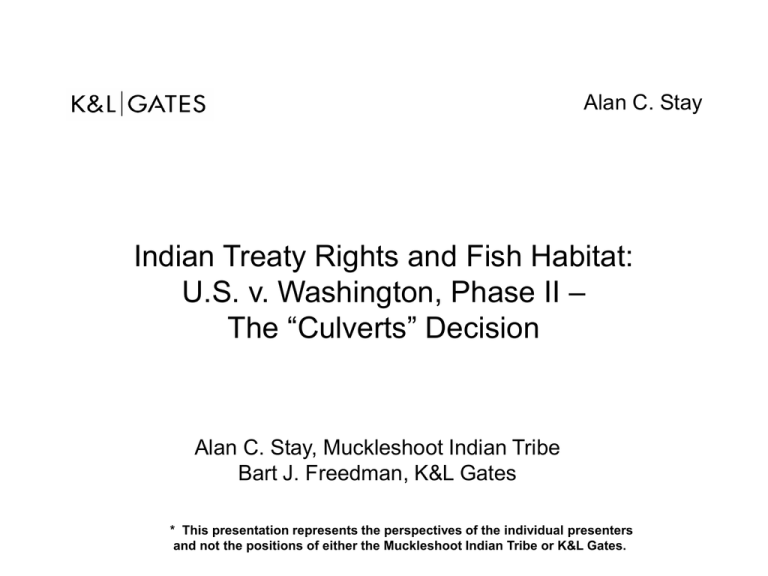
Alan C. Stay
Indian Treaty Rights and Fish Habitat:
U.S. v. Washington, Phase II –
The “Culverts” Decision
Alan C. Stay, Muckleshoot Indian Tribe
Bart J. Freedman, K&L Gates
* This presentation represents the perspectives of the individual presenters
and not the positions of either the Muckleshoot Indian Tribe or K&L Gates.
Alan C. Stay
Tribal Treaty Rights
in the Pacific Northwest
• Stevens / Point Elliot Treaties
– Arose out of increased non-Indian settlement in the Pacific
Northwest in the early- to mid-1800s.
– Executed during 1854 and 1855.
– Each contains the provision that “the right of taking fish, at all
usual, and accustomed grounds and stations, is further
secured to said Indians, in common with all citizens . . .”
Alan C. Stay
Interpreting Indian Treaties (1)
• They are construed as the Indians would have
understood them at the time of signing, and
ambiguities are construed in favor of Indians.
• They describe rights “reserved” by the Tribes
rather than “granted” by the United States.
• Courts presume that Tribes continue to possess
all rights to land enjoyed at the time of signing.
Alan C. Stay
Interpreting Indian Treaties (2)
• Congress has plenary power over Tribes. It can abrogate treaty
promises, alter tribal powers of self government, extinguish title to
land (with just compensation), and even eliminate a tribe’s formal
existence. Congress must, however, act in a manner rationally
linked to its unique obligations to Tribes.
• Where Congress has not specifically and unequivocally abrogated
treaty rights, courts will enforce them scrupulously.
• Abrogation of a treaty right may result in a duty to pay compensation
to the affected tribe.
Alan C. Stay
Treaty Fishing Rights –
Components
Alan C. Stay
Established Treaty Rights –
“Fair Share”
• Tribes are entitled to half of the available fin and shellfish, with a
“moderate living” limitation.
• “Moderate living” allows the tribal share to be reduced if a share of
less than 50% will support a moderate living from fishing for tribal
members.
• Hatchery fish are included as part of the available salmon harvest
for treaty purposes.
• Currently, the presumption is that Indians are not making a
moderate living from fishing.
Alan C. Stay
Established Treaty Rights –
“Access”
• “Geographic Entitlement:” A tribe has a right to
access “usual and accustomed” fishing areas.
• Tribal members may cross private lands to fish.
• Courts view with extreme skepticism any action
that attempts to eliminate reserved geographic
treaty fishing locations.
Alan C. Stay
Established Treaty Rights –
“Shellfish”
• Tribes are entitled to one half of the
naturally occurring shellfish on private
tidelands in Washington State.
Alan C. Stay
Additional Treaty Right –
“Habitat Protection”
• Tribes have asserted that their treaties
guarantee them the continued existence of
abundant salmon populations in the Pacific
Northwest sufficient to allow treaty Indians to
meet their moderate living needs from fishing.
• Such a right would impose an affirmative
obligation to protect salmon habitat.
Alan C. Stay
Habitat Protection –
Prior Litigation
• In 1980, the district court for the Western District of
Washington recognized a treaty right and protection of
fish habitat. It held that the state must not degrade or
authorize degradation of salmon habitat that interferes
with “moderate living.”
• The Ninth Circuit at first limited this ruling to require
“reasonable steps . . . to preserve and enhance the
fishery,” but then vacated the ruling and declined to
explore this right until a concrete dispute was presented.
Alan C. Stay
Habitat Protection –
Culvert Litigation
• In January 2001, tribes with treaty rights in Puget Sound
and along the Washington coast filed an action claiming
that culverts designed and maintained by the State
violated their treaty rights by harming salmon habitat.
• The State study estimated that between 50 and 300
culverts significantly impair fish passage, the repair of
which would result in a return of an additional 200,000
salmon.
Alan C. Stay
Culvert Case
Summary Judgment
• Judge Martinez grants Summary Judgment to
Tribes “find[ing] that the Treaties do impose a
duty upon the State to refrain from building or
maintaining culverts . . .” that block fish passage.
• SJ Order at pg. 12.
Alan C. Stay
Causation
• “The State argues that the Tribes have produced no evidence that
the blocked culverts ‘affirmatively diminish[] the number of fish
available for harvest.’ The Tribes have, however, produced
evidence of greatly diminished fish runs. Where there may be other
contributing causes for this, the conclusion is inescapable that if
culverts block fish passage so that they cannot swim upstream to
spawn, or downstream to reach the ocean, those blocked culverts
are responsible for some portion of the diminishment. It is not
necessary for the Tribes to exactly quantify the numbers of
‘missing’ fish to proceed in this manner.”
• Order on Cross-Motions for Summary Judgment (“SJ Order”) at pg.5
(emphasis added).
Alan C. Stay
Intent of the Parties (1)
• “. . . the Governor’s promises that the
treaties would protect that source of food
and commerce were crucial in obtaining the
Indians’ assent.”
• SJ Order at pg. 9, citing State of Washington, et
al., v. Washington State Commercial Passenger
Fishing Vessel Association, et al., 443 U.S. 658
(1979) (emphasis added by Judge Martinez).
Alan C. Stay
Intent of the Parties (2)
• “It was thus the government’s intent, and the Tribes’
understanding, that they would be able to meet their own
subsistence needs forever . . .”
• SJ Order at pg. 10.
• “I want that you shall not have simply food and drink
now but that you may have them forever.”
• SJ Order at pg. 10, citing Decl. of Richard White, DKT.
#296, ¶¶13, 14 which quotes Governor Stevens
(emphasis added by Judge Martinez).
Alan C. Stay
Environmental Protection (1)
• “. . . and the related right not to have the fishery
habitat degraded to the extent that the minimum
standard cannot be met. I also agree that the State
has a correlative duty to refrain from degrading or
authorizing others to degrade the fish habitat in such
a manner.”
• SJ Order at pg. 7, citing United States v. Washington,
694 F.2d 1353, 1367 (9th Cir. 1982) (emphasis added by
Judge Martinez).
Alan C. Stay
Environmental Protection (2)
• “It was thus the right to take fish, not just
the right to fish, that was secured by the
treaties.”
• SJ Order at pg. 10.
Alan C. Stay
Environmental Protection (3)
• “These assurances would only be
meaningful if they carried the implied
promise that neither the negotiators nor
their successors would take actions that
would significantly degrade the resource.”
• SJ Order at pg. 11.
Alan C. Stay
Case Status
• Current settlement discussions on remedy.
• State of Washington undeclared as to
appeal on merits.
Alan C. Stay
Implications / Issues Remaining
1. Is Court’s order a “narrow directive” to refrain
from impeding fish runs in one specific
manner?
2. Application to existing infrastructures.
3. Application to other governments, private
parties.
4. Regulatory impact.
Arguably, ruling is very broad:
• The Court found that historic alterations to
the environment that impede fish are a
treaty violation.
Implications
Built infrastructure. Now potentially subject
to Treaty claims:
• Culverts – state, local, private.
• Access to estuarine habitat, i.e., tide gates
and flood gates.
• Dams.
Additional Implications:
• Development of habitat for housing and
other uses.
• Pollution, current or historic.
• Stream flow and river temperatures.
Impact of District Court Order
Right of Access:
• Muckleshoot v. Hall.
• Corps of Engineers requires tribal
concurrence on permits, implicating treaty
rights.
Regulatory Impact
of Culvert Decision
• Federal, local and state regulators may
require tribal consultation on a broad
range of permit issues.
Future Litigation?




